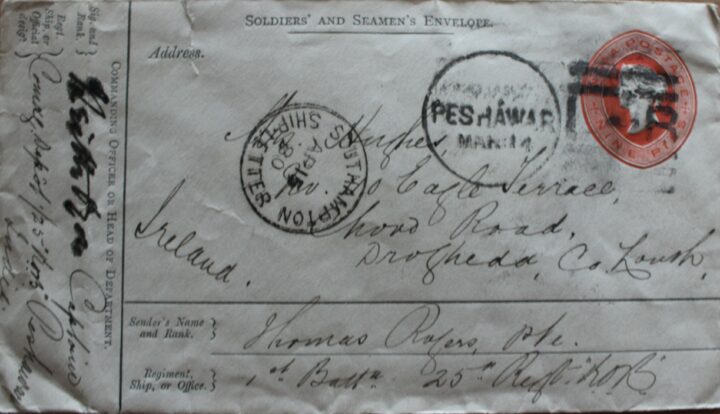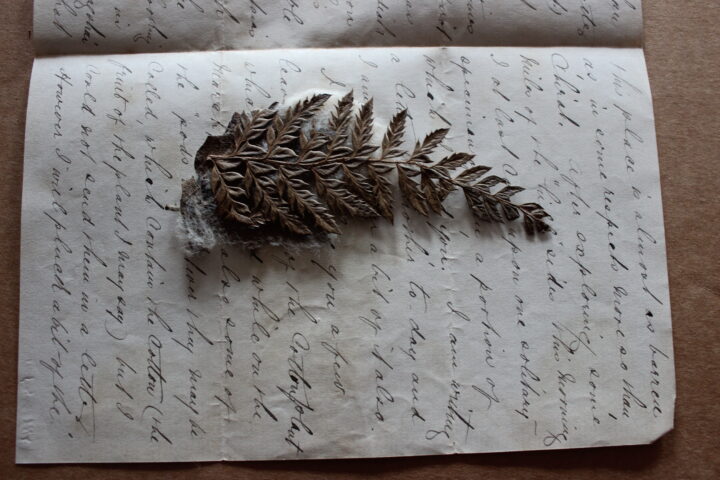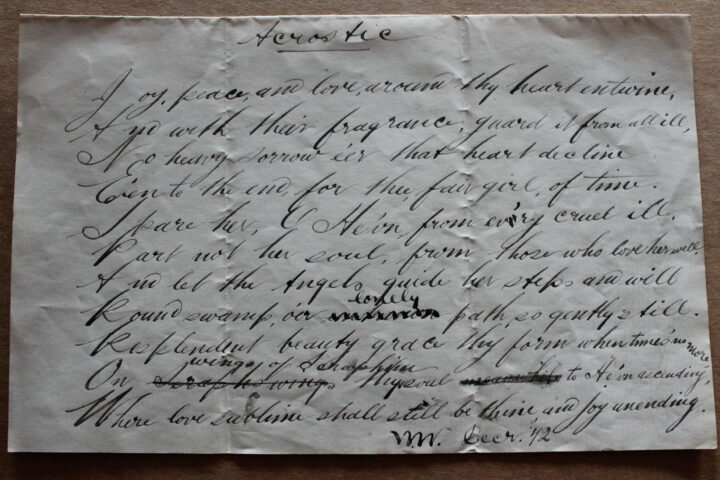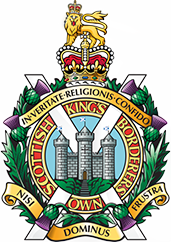The Letters of Thomas Rogers
This is not a story of Captains or Colonels. It is not a story of heroics, and there are no particular instances of gallantry or conspicuous bravery. It is the story of a boy who runs away from home only to find himself swept into a new life of epic journeys, wars, friendship, and death. Within a series of letters spanning eight years, we see him develop and become accustomed to life in the army, yet at the core of the letters is the constant and unwavering love he has for his sister and family – and the pull to one day return home.

At the age of sixteen, Thomas Sparrow ran away from home in Ireland with another boy from his school. He changed his name to Thomas Rogers (the surname of his grandmother who lived in his family home) and joined the King’s Own Borderers around 1870. There is a report of desertion for a Thomas Rogers with the same service number in 1875 but, by January 1876, he appears to have returned and this is where his epistolary journey begins.
Each letter opens with ‘Dear Jane…’, and ends ‘I remain your affectionate brother.’ In every letter he asks after her health, and that of the rest of the family – sending his love on to their parents, cousins and friends, and frequently referencing parcels and letters passing between them. What is striking very early on is that Thomas wants to share so many of his experiences with his sister and open her eyes to the beauty of the rest of the world. It is also at this time that the 1st/25th Foot sail to India aboard the Malabar, equipped with the newly developed Martini-Henry breech-loading rifle, and it seems that Thomas Rogers makes it there with them.
Fyzabad, Thursday 14th January 1876
…Everything you meet with is novel to the eye. Everything quite different from what you see in Europe. Dress is quite different, of course the European residents (which are very few indeed in comparison with the native population) dress the same as they would in Europe, in fact it is highly amusing to notice the dress, manners and customs of the natives and to listen to their language, which I am beginning to pick up. Some of the fruit also in this country is most delicious, never tasted or even saw the like in Europe. Oranges grow in plenty about here and now at present the trees are actually loaded with them. It would do you good to see them.
His awareness of his surroundings is not restricted to his first traveling overseas, and throughout his letters he retains the same sense of awe and enthrallment with each new location. He mentions occasional photographs that he has sent to Jane in some of his letters, but no such pictures are to be found in the collection. What has survived are the little leaves, flowers and feathers he includes in his letters- like in this one dated January 9th, 1877, Nainital:
I think I enclosed you a few ferns in my last [letter], however I enclose you a few in this, which I hope you will like. I shan’t be able to send you many more ferns from the Himalayas as we leave here so soon, but perhaps I shall be able to send you some other “specimens” from the plains of Bengal.

In the same letter he compliments her on the very pretty Christmas card she sent and says that he received “more Christmas cards than all the remainder of the 25th in Nainital.”
Thomas describes with relish the Christmas dinner of “roast ducks, plum pudding, ham and all kinds of vegetables, pickles etc. I left the men sitting over their beer, toasting absent friends in England and elsewhere, and went out with another man, who invited me to a social meeting of the ‘Good Templars’, where after several addresses on temperance, etc, we partook of a good tea, and enjoyed ourselves.
Jane clearly approves of his avoidance of drinking as, over the course of a few letters, they both seem to be in agreement with each other that a little bit of alcohol now and then is acceptable but that it is generally best avoided in favour of tea. Charles Woollcombe, Lieutenant at the time and later Colonel of the Regiment, also wrote that he had “heard wonderful stories about drinking in India” but that the officers of his regiment were “very moderate in that respect.”
It seems Thomas must have received a good education. His writing is visually beautiful, if difficult to decipher at times. He has a quaint turn of phrase and, obviously not wishing to pen boring letters to his sister, injects each one with humour and descriptions of scenes far removed from her home in Ireland. In the following correspondence he describes the march to another camp:
Nainital, Sunday 23rd April 1876
I suppose I need not tell you that it was camels that carried our baggage, because I suppose you know that it is always either elephants or camels that carry our baggage when we are on the march in this country. […] We had a jungle to march through called the black jungle or ‘black forest’, it took us two days to march through it and it was full of tigers, leopards, panthers etc. etc. but of course they won’t touch British soldiers, they have better sense. …after 10 days stiff marching we arrived at Nainital, and a more beautiful place you never saw, I can’t describe it properly, on the side of some very large hills or mountains covered with trees of the most beautiful kind, long grass and beautiful flowers […] and if you can just imagine the nicest place you ever read or dreamt of, I am there, I am in the nicest place on earth.
Further proof of Thomas’ affection for his sister lies in a poem he wrote for her, dated December 1872 but mixed in amongst the letters. The first letter of each line spell out her name.

Acrostic
Joy, peace and love around thy heart entwine,
And with their fragrance, guard it from all ill,
No heavy sorrow e’er that heart decline
Even to the end, for thee, fair girl of time.
Spare her, Heav’n from every cruel ill,
Part not her soul, from those who love here well
And let the Angels guide her steps and will
Round swamp, o’er lonely path so gently still
Resplendent beauty grace thy form when times no more
On wings of Seraphim thy soul to Heav’n ascending,
Where love sublime shall still be thine and joy unending.
December 72.
So far in his letters, Thomas Rogers has shown us that life in India seemed quite idyllic for the 1st/25th of Foot at that time. He writes as though he has found his own paradise and, speaking from Fyzabad at the same time, Woolcombe also speaks about it being a “sociable little place and one dined out a lot. We used to have afternoon tea parties in the Mess, tennis and dancing.” It all sounds delightful, but war was lurking close by and Thomas Rogers’ letters become tinged with a more serious tone. In the next post… sickness, moving camps and a certain Mr Hughes…
